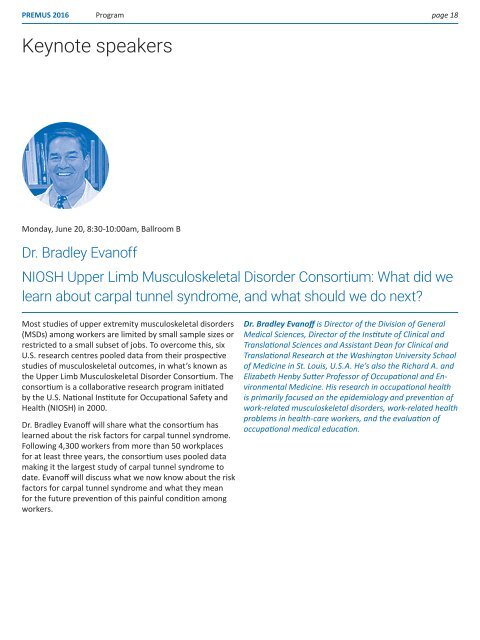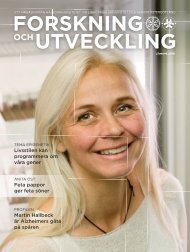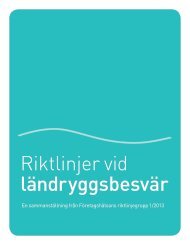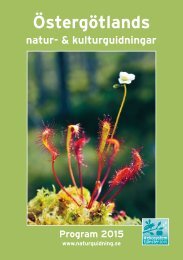PREMUS2016
25Pj5tb
25Pj5tb
Create successful ePaper yourself
Turn your PDF publications into a flip-book with our unique Google optimized e-Paper software.
PREMUS 2016<br />
Program<br />
page 18<br />
Keynote speakers<br />
Monday, June 20, 8:30-10:00am, Ballroom B<br />
Dr. Bradley Evanoff<br />
NIOSH Upper Limb Musculoskeletal Disorder Consortium: What did we<br />
learn about carpal tunnel syndrome, and what should we do next?<br />
Most studies of upper extremity musculoskeletal disorders<br />
(MSDs) among workers are limited by small sample sizes or<br />
restricted to a small subset of jobs. To overcome this, six<br />
U.S. research centres pooled data from their prospective<br />
studies of musculoskeletal outcomes, in what’s known as<br />
the Upper Limb Musculoskeletal Disorder Consortium. The<br />
consortium is a collaborative research program initiated<br />
by the U.S. National Institute for Occupational Safety and<br />
Health (NIOSH) in 2000.<br />
Dr. Bradley Evanoff will share what the consortium has<br />
learned about the risk factors for carpal tunnel syndrome.<br />
Following 4,300 workers from more than 50 workplaces<br />
for at least three years, the consortium uses pooled data<br />
making it the largest study of carpal tunnel syndrome to<br />
date. Evanoff will discuss what we now know about the risk<br />
factors for carpal tunnel syndrome and what they mean<br />
for the future prevention of this painful condition among<br />
workers.<br />
Dr. Bradley Evanoff is Director of the Division of General<br />
Medical Sciences, Director of the Institute of Clinical and<br />
Translational Sciences and Assistant Dean for Clinical and<br />
Translational Research at the Washington University School<br />
of Medicine in St. Louis, U.S.A. He’s also the Richard A. and<br />
Elizabeth Henby Sutter Professor of Occupational and Environmental<br />
Medicine. His research in occupational health<br />
is primarily focused on the epidemiology and prevention of<br />
work-related musculoskeletal disorders, work-related health<br />
problems in health-care workers, and the evaluation of<br />
occupational medical education.





